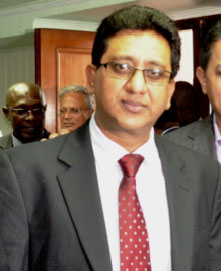Government is counting on APNU to support the passage of the Anti-Money Launder-ing and Countering the Financing of Terrorism (Amendment) Bill 2013, while the AFC holds out for the setting up of the Public Procurement Commission (PPC) — concerns about which it will take to the regional anti-laundering body — along with other measures.
The bill was sent to a special select committee on May 7. Unless it is passed by May 27, Guyana will be slapped with a volley of sanctions with regard to the movement of money to and from the country.

Minister of Legal Affairs and Attorney General Anil Nandlall said yesterday that the government is optimistic of the support of APNU with regard to the Anti-Money Laundering legislation. The AFC has publicly announced that it will withhold support for the bill unless the government sets up the PPC and unless President Donald Ramotar assents to two opposition-piloted bills passed in the House earlier this year.
“As a member of the Select Committee and having regard to what has transpired in the select committee meetings, I am very optimistic we will have cordial business of the committee within the timeframe,” Nandlall told Stabroek News when contacted.
“The Alliance for Change ought to know the importance of this bill but they have chosen to ignore this and embark on petty partisan politics on an issue of national importance,” he added.
“The reasons they have advanced I find unacceptable. What they have failed to put out is that these are APNU bills and from all I have seen the APNU is supporting the bill in recognition of its importance to Guyana.”
He stressed that “The AFC is displaying a level of immaturity which is unbecoming of a political party in Parlia-ment.”
According to the Attorney General, sanctions would mean money leaving the country would be treated as suspect. “It will be tainted with the stigma of illegality and countries will be free to impose whatever sanctions they deem necessary.”
He added that it is usual for local commercial banks to be authorised agents for larger banks in the Caribbean and the other parts of the world and hence they would have to comply with the regulations of their jurisdictions and these include having relationships with organisations in countries that are suspected of being engaged in money laundering and financing of terrorism.
“Once we have been put on that list, every form of transfer of money out of Guyana can be affected since there is the presumption that the money is tainted,” he said, adding that companies dependent on wire transfers may have to find other methods of payment and this puts in jeopardy businesses like auto dealerships, money transfers and those making international internet purchases.
Basil Williams of the APNU said his party will be “taking its time” with the bill because of the complicated nature of it and the short amount of time afforded for its passage. “We had said from the outset that the bill is complicated and that we had to go through it,” he said. The party had stated publicly that it would not sacrifice its deliberations into the bill to meet any deadline.
Williams told Stabroek News during a brief interview yesterday that the party will be proposing a number of amendments, all of which he did not want to reveal to this newspaper. With regard to one of those proposed amendments, he said the party believes interdictions of persons with large amounts of cash should be expanded from just at the airport to anywhere in the country.

Commenting on the possibility of sanctions against Guyana, President of the Georgetown Chamber of Commerce and Industry (GCCI) Clinton Urling said the position taken by the AFC cannot be in the best interest of everyone concerned and will have serious repercussions for the country as a whole.
“Although the AFC has put on the table a very legitimate issue that needs to be addressed urgently and frontally by the government, i.e the establishment of the Public Procurement Commission, the AFC has chosen the wrong platform to leverage its position and to force the government to act,” said Urling.
“If the Financial Action Task Force requirements are not met by the deadline and our country is blacklisted, the repercussions would hurt not only government but also our private sector, our country’s image as an investment destination, and ultimately the country’s development as a whole,” he stressed.
Urling noted that these political developments are occurring at a time when the country’s social, political and economic challenges are so enormous and its politics seem so small. “We need political approaches from the executive and the legislature that achieve consensus and not confrontation,” he said.
“We are all caught in an inescapable web of mutuality and actions by both the government and opposition ultimately affect the country’s development and thus each and every one of us as citizens,” he said.
“Moreover, I see a pernicious structural situation developing where the opposition is willing to use critical policy platforms to get the government to act. To avoid this I recommend the following two prescriptions: (1) Both government and combined opposition need continuous dialogue and engagement to ensure a reconciliation of positions and to understand what the other side’s demands are and to arrive at consensus positions to avoid what we saw with the budget amendments and now with the money laundering legislation; and (2) It is clear that this new dispensation will require a more salient role for civil society, particularly, with the establishment of a civil society commission or group of observers to the tripartite talks,” said Urling.
“This civil society component would ensure that agreements reached and deals brokered are implemented. It would also give account to the public on the state of affairs of the dialogue and act as a verifying authority on the proceedings at those talks,” he told this newspaper.
The Central Corentyne Chamber of Commerce at its statutory meeting on Friday called on the opposition parties to urgently work with the government to ensure the passage of the legislation before the deadline. “If Guyana defaults and has to face sanctions, the entire Guyana, including constituencies of the opposition would suffer. This is not an option. We do not feel it is appropriate to bargain with this important legislation and hope all parties would expeditiously examine and pass it,” the Corentyne Chamber said.

The Corentyne Chamber also called on the government to explain the delay in the activation of the Procurement Commission “which would vitally ensure accountability and transparency in government procurement.”
Leader of the AFC and Member of Parliament (MP) Khemraj Ramjattan said he would like to impress upon the authorities that can impose the sanctions on Guyana the need for the setting up of the Public Procurement Commission.
“We feel whatever sanctions are to follow must be placed on the delinquencies and delays of the PPP/C government since they failed to bring the matter earlier to the National Assembly,” he said.
Ramjattan noted that there was a report since 2011 indicating that Guyana was non-compliant in several respects “yet the government did nothing in that time.”
He said the AFC was totally unaware of the documentation of the Caribbean Financial Action Task Force (CFATF) on Guyana, as well as the letter written to the President saying that Guyana would have been in difficulty if these concerns were not speedily addressed. “They are going to pay the penalty for this,” said Ramjattan, referring to the government.
“We want them to understand that the PPC in Guyana will help with the culture of transparency and accountability… The opposition is forcing the government to see that the setting up of the PPC is a microcosm of the country becoming compliant with regard to money laundering and combating the financing of terrorism,” he said. “The [CFATF] people will appreciate what the opposition in Guyana is calling for in the establishment of the PPC.”
Ramjattan said too that it is not only about the passage of laws but their successful and effective implementation and enforcement. “We would tell the CFATF meeting to ease up on the sanctions on Guyana and urge them not to have immediacy in the penalties to be applied,” he said.
“We are not just going to pass the legislation just like that. We must ensure that the bill is scrutinised,” Ramjattan noted.
He said the AFC will propose amendments to the legislation and one of those amendments would be for the Financial Intelligence Unit to be staffed by between four and five persons and not just one person, which is the case today. Further, he said, the AFC will propose that the appointments of these persons be done by the Appointing Committee of the National Assembly. He said that if this is the case, the chances of executive interference of the work of the FIU are lessened.





